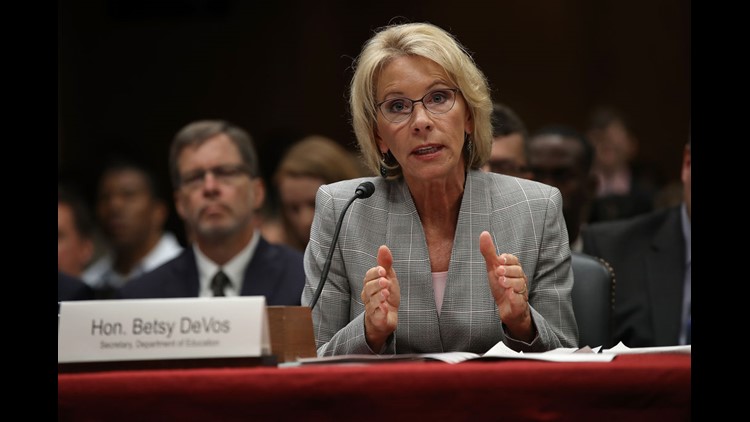A coalition of 18 states and the District of Columbia sued the Education Department and Secretary Betsy DeVos Thursday for rescinding Obama-era rules aimed at protecting students from predatory colleges.
The "borrower defense" rule, which was scheduled to be effective on July 1, allow student loan borrowers to apply for loan forgiveness if they were defrauded by for-profit schools. It also largely prohibits schools that participate in the federal student loan program from forcing students to use arbitration to settle legal disputes and waive their class action rights.
The states' complaint alleges that the Education Department violated federal law by rescinding the rules, which were finalized by the Obama administration in November.
The Education Department "effectively canceled a duly promulgated regulation without soliciting, receiving, or responding to any comment from any stakeholder or member of the public, and without engaging in a public deliberative process," according to the states' complaint.
The Trump administration has been clear about wanting to eliminate what it considers to be burdensome regulations for the private sector. Since taking the helm at the Education Department earlier this year, DeVos, the daughter-in-law of Amway founder Richard DeVos and a strong proponent of charter schools, has been chipping away at the student protection rules enacted by the Obama administration.
“Since day one, Secretary DeVos has sided with for-profit school executives against students and families drowning in unaffordable student loans,” said Massachusetts Attorney General Maura Healey, who led the lawsuit.
Regulators in the Obama administration particularly focused their enforcement on fraudulent for-profit schools that charge thousands in per-yer tuition and fees while advertising misleading or inaccurate statements about graduates' prospects for finding jobs in their fields of study.
Students at for-profit colleges accounted for about one-third of defaults -- even though they make up a small percentage of all post-secondary schools in the country -- in the three-year period starting in 2013, according to the Department of Education. About 44 million people in the U.S. hold $1.34 trillion in student loan debt, says data from the New York Fed Consumer Credit Panel/Equifax. That’s more than all credit card or car loan debt held by American consumers.
Amid the crackdown, several for-profit schools, including Corinthian Colleges and ITT Technical Institute, have shut down, driving the industry to step up their lobbying efforts for regulatory relief after Trump's victory in November.
In May, DeVos signaled her intent to target the borrower defense rule and subsequently said that its implementation would be delayed. The Education Department also announced its intent to issue a new rule to replace the borrower defense rule.
In enacting the borrower defense rule last year, the Obama administration reviewed over 10,000 comments from students, school officials and consumer advocates, and gave schools more than six months to prepare for the implementation.
Last Friday, the Department of Education also delayed the implementation of the so-called gainful employment rule by a year to July 1, 2018.
Finalized by the Obama administration in 2014, the rule requires colleges offering career education programs to provide information to students to help them assess the value of the education they would receive. The required information includes on-time graduation rates, percentage of students that land jobs in the chosen field, typical wages for graduates and debt amounts students can expect.
The worst-performing programs cited by the Department of Education — those that consistently leave their graduates with more debt than they can repay – are required to show evidence of improvement or lose eligibility for federal funding.
Student and teacher advocate groups approved the lawsuit filing Thursday. “It is no surprise that these regulations have been strongly opposed by for-profit schools, which have saddled students with crushing debts for college degrees," said Lily Eskelsen García, president of the National Education Association, an lobbying group for public school teachers. "Some of the degrees provided by these for-profit institutions ...are often not even worth the paper on which they’re printed."
Other state attorneys general joining the lawsuit are from California, Connecticut, Delaware, Hawaii, Iowa, Illinois, Maryland, Minnesota, New Mexico, New York, North Carolina, Oregon, Pennsylvania, Rhode Island, Vermont, Virginia, Washington, and the District of Columbia.



